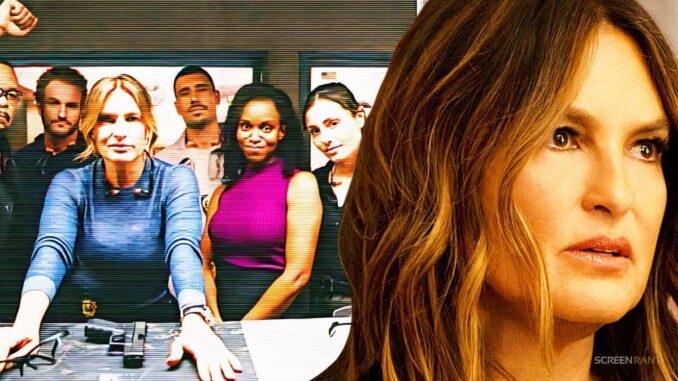
The Indivisible Crown: Benson’s Journey, Hargitay’s Reign
For twenty-seven years, a singular, unwavering light has cut through the darkness of television’s most harrowing narratives. It is the light of Olivia Benson, the bedrock of Law & Order: Special Victims Unit, a character whose journey from earnest rookie detective to compassionate Chief of Detectives has become a touchstone of resilience and justice. Yet, the brilliance of Benson is inextricably linked to the woman who has breathed life into her: Mariska Hargitay. Her own star, ascendant and enduring, has not merely portrayed Benson; it has mirrored her, forging a unique, symbiotic reign that transcends the screen, shaping both character and actress in a seamless, profound tapestry of influence.
The mirroring begins at their genesis. Olivia Benson, when we first met her, was a woman of fierce idealism, driven by a personal history of trauma to advocate for those who could not advocate for themselves. She was raw, empathetic, and often, heartbreakingly vulnerable. Simultaneously, Mariska Hargitay, though carrying the legacy of Hollywood royalty, was building her own narrative, seeking a role that would allow her to unleash her formidable talent and humanitarian spirit. SVU was her crucible, Benson her calling. In those early seasons, we watched Benson meticulously learn the brutal lessons of the streets, her moral compass hardening even as her heart remained soft. In parallel, Hargitay honed her craft, mastering the nuance of trauma, the rhythm of interrogation, and the profound weight of bearing witness to unimaginable pain. The actress’s dedication to understanding the psyche of a survivor was so absolute that it infused Benson with an authenticity rarely seen, transforming her from a character outline into a living, breathing testament to the human spirit’s capacity for endurance.
As Benson navigated the labyrinthine bureaucracy of the NYPD, faced personal betrayals, and stared down the darkest corners of humanity, her character deepened, becoming a symbol of unwavering advocacy. She wasn’t just solving cases; she was a voice for the voiceless, a protector, a survivor herself. This evolution found its perfect reflection in Hargitay’s own journey beyond the soundstage. The emotional demands of playing Benson, of immersing herself in stories of sexual assault and domestic violence, spurred Hargitay to action. She founded the Joyful Heart Foundation, a nonprofit dedicated to healing, educating, and empowering survivors. Here, the mirror becomes most vivid: Benson’s on-screen empathy and tireless fight for justice found its real-world counterpart in Hargitay’s off-screen activism. The actress wasn’t merely performing a role; she was living its ethos, translating the character’s fictional struggles into tangible, impactful change. The crown of her “reign” became not just her Emmy awards, but the lives she touched and the awareness she raised.
The longevity of their combined tenure, a staggering twenty-seven years, further cements this mirroring. Benson’s ascent from detective to sergeant, lieutenant, and finally Captain and Chief, is a testament to her steadfast commitment and earned authority. She commands respect, not through force, but through a lifetime of ethical leadership and bruised solace. Hargitay’s own career trajectory has been equally remarkable. She has not only sustained a leading role for over two decades—an unprecedented feat in television—but she has grown into an industry titan. She directs, she produces, and she has become synonymous with the show itself. Her “star” radiates not just from her acting ability, but from her unwavering professionalism, her profound impact on the show’s narrative direction, and her continued engagement with its vital social mission. She has, in essence, reigned over her domain with the same wisdom and grace that Benson commands her squad room.
The weight of such a reign, both fictional and real, is immense. Benson carries the burden of every victim she has encountered, every injustice she has fought. Her eyes, often shadowed with a profound weariness, betray a soul that has seen too much, yet refuses to break. Similarly, Hargitay has spoken openly about the emotional toll of her role, the necessity of self-care, and the constant navigation of a character that demands so much. Yet, both persevere, evolving beyond their initial definitions. Benson became a mother, not just to Noah, but to countless survivors and her own squad, demonstrating a softer, yet still fiercely protective, side. Hargitay, too, embodies a powerful maternal energy, both in her personal life and in her public advocacy, offering comfort and strength to those in need.
In the end, Benson’s journey and Hargitay’s reign are less a reflection and more an ouroboros, each feeding and defining the other. The unflinching gaze of Olivia Benson, her unwavering resolve to seek justice, has been forged in the very soul of Mariska Hargitay. And in return, Hargitay’s star, shining with an authentic luminosity and humanitarian purpose, has elevated Benson from a mere character to a cultural icon, a symbol of hope and resilience that resonates deeply with millions. After twenty-seven years, they stand not as separate entities, but as two sides of the same indelible coin, their combined legacy a testament to the power of commitment, empathy, and an enduring fight for a more just world. It is a reign not of conquest, but of profound, transformative compassion.
